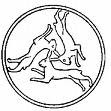With the first 3rd of the year nearing a close, I felt I would post a list of what I've read so far. Needless to say, due to school, this list is much shorter than it typically is by this time of year. The last two years I set myself the, at the time, highly manageable, goal of reading 150+ books. 2010 I exceeded that and nearly cleared 170. 2011 I started school in the fall, and it became a truly monumental struggle to meet my goal of 150 volumes, I did it, but only barely.
This year I opted to set my goal lower, 75 books, for the year.
1. Gardens of the Moon - Malazan: Book of the Fallen #1 - Steven Erikson *****
2. Tree of Smoke - Denis Johnson ****
3. Beyond Good and Evil - Friedrich Neitzsche ***
4. The Maker of Universes - World of Tiers #1 - Phillip Jose Farmer ***
5. The King and the Cowboy - David Fromkin **
6. The Gates of Creation - World of Tiers #2 -Phillip Jose Farmer ***
7. Pigeon Feathers - John Updike *** (Read for school)
8. Quag Keep - Andre Norton ***
9. A Private Cosmos - World of Tiers #3 - Phillip Jose Farmer ***
10. Deadhouse Gates - Malazan: Book of the Fallen #2 - Steven Erikson ***
11. The Things they Carried - Tim O'brien *** (Read for school)
12. Beyond the Walls of Terra - World of Tiers #4 - Phillip Jose Farmer **
13. The Joy Luck Club - Amy Tan ** (Read for School)
14. The Rise of the West - William Hardy Mcneil ****
15. The lavalite World - World of Tiers #5 -Phillip Jose Farmer **
16. In Love and Trouble - Alice Walker ** (Read for School)
17. The Oracle Betrayed - Oracle #1 - Catherine Fisher ****
18. World War One British Poets - Candace Ward *** (Read for school)
19. 1421: The Year China Discovered America - Gavin Menzies * (Read for school, Utter Crap)
20. A Vocation and a Voice - Kate Chopin *** (Read for school)
21. Magician: Apprentice - Riftwar #1 - Raymond E. Feist ****
22. Red Orc's Rage - World of Tiers #6 - Phillip Jose Farmer *
23. Memories of Ice - Malazan: Book of the Fallen #3 - Steven Erikson ****
24. More than Fire - World of Tiers #7 - Phillip Jose Farmer **
25. Howl's Moving Castle - Diana Wynne Jones ****
26. Tolkien and the Great War - John Garth ****
27. House of Chains - Malazan: Book of the Fallen #4 - Steven Erikson ***
Currently working on House of the Wolfings by William Morris, Midnight Tides by Steven Erikson and Magician: Master by Raymond E. Feist.
Mapping the Blogosphere
5 hours ago
